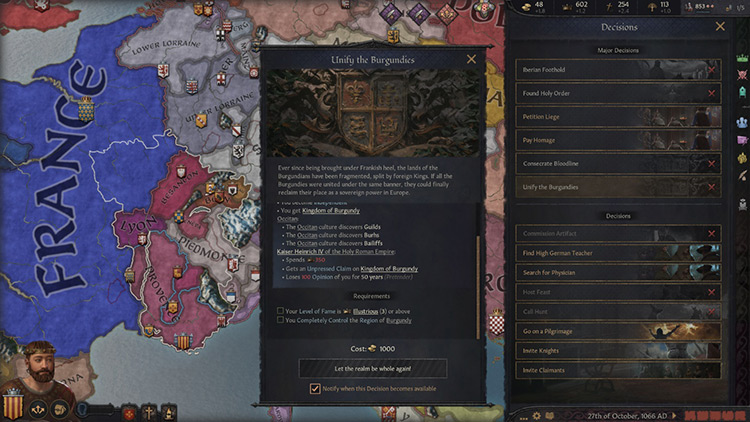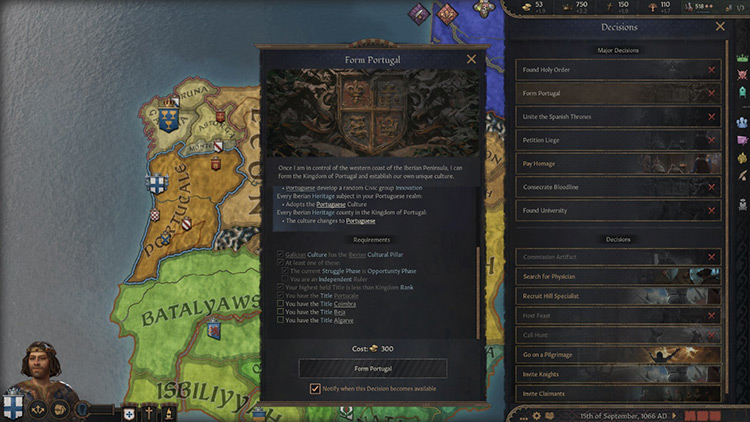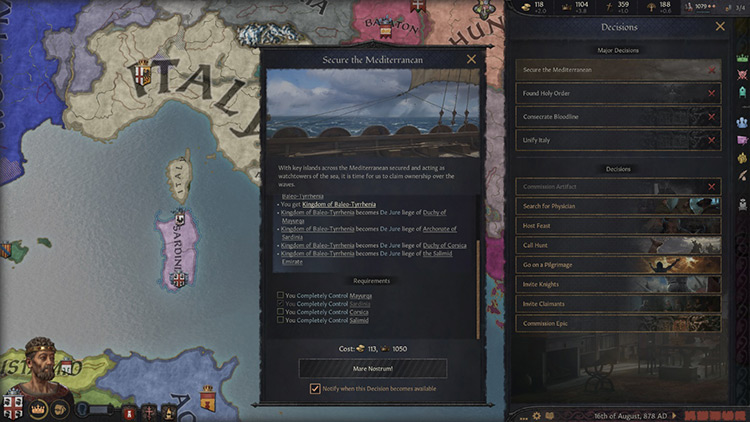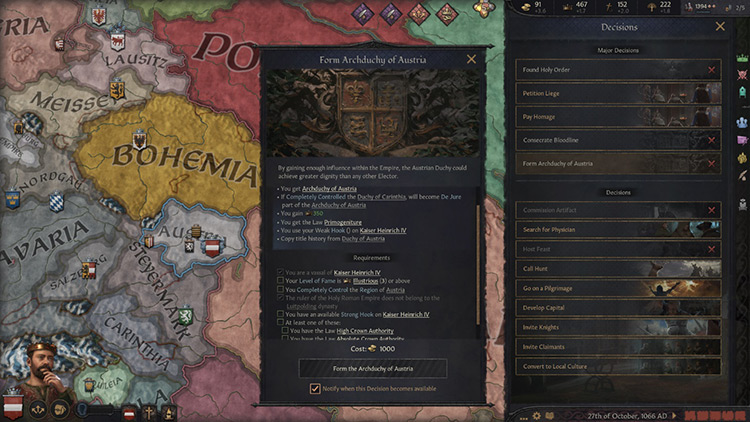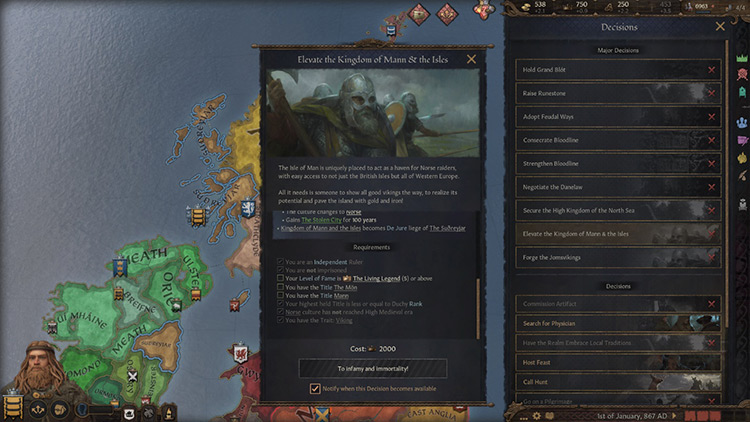Usually, these kingdoms come with some extra bonuses. Be it a free cultural innovation or a change of succession law, it’s always something you would welcome. While there are multiple kingdoms to pick through, I singled out five that stand out the most. Forging a realm through decision is far more epic than just acquiring half the land and creating the title by paying some gold.
5. Burgundy
Burgundy is a special case. It exists de jure in both starting dates, meaning you can form it by simply controlling half its de jure land. However, there is also a decision about forming the kingdom, one that you should attempt to enact. The decision requires you hold the land of the de jure kingdom of Burgundy, plus the duchy of Burgundy in France. Having an illustrious level of fame and the necessary land, you can finally unify the Burgundies, drifting the duchy into the Kingdom. The de jure drift is cool and will help you consolidate the realm, sure, but the extra bonuses the decision provides are what make it exceptional. First of all, it will automatically make you independent if you are a vassal. This is huge as you can enact this decision even as a vassal to a king! Just make sure your overlord doesn’t create the Kingdom title for himself. On top of that, you will become Occitan in culture and discover three innovations of the early and high medieval era, giving you a significant technological boost if you take the decision early.
4. Portugal
Let’s be real: The Iberian Peninsula looks weird without Portugal in the western corner. The kingdom doesn’t exist de jure in either starting date, with its modern lands split between Galicia and Badajoz. A ruler who controls all 4 duchies that eventually make part of the kingdom can declare himself King. If the struggle phase is “opportunity” you can even enact the decision while a vassal. The decision does little to help you technologically, with a random civic innovation being discovered by the new Portuguese culture that you and your vassals will adopt. This new culture is a big part of the decision’s power. You and your vassals will embrace it, and so will all counties inside the fledgling kingdom that have a culture of Iberian heritage. All counties in Portugal fulfil that condition at the game’s start, giving you a homogenous and easy to control kingdom.
3. Baleo-Tyrrhenia
Baleo-Tyrrhenia is a kingdom named after the seas on each side of Sardinia, the Balearic to the west and the Tyrrhenian to the east. The decision offers no cultural innovations nor forms any new cultures. First and foremost, it gives you a neat and consolidated island kingdom in the western Mediterranean, with all its isles under a de jure title. Also, the decision provides a unique casus belli to your dynasty for an entire century that allows the conquest of single counties that border the Mediterranean Sea. While you may have better casus bellis against many rulers, this one can be helpful as it targets a single county, giving you easier ticking warscore against powerful enemies. On top of that, your dynasty will enjoy a temporary, century long modifier, giving some prestige and military bonuses in coastal holdings. This synergizes perfectly with the unique casus belli, allowing you to punch above your weight, especially when it comes to island provinces.
2. Austria
Austria, the homeland of the Hapsburg monarchy, isn’t yet a reality in either starting date. While it does exist as a march at the empire’s fringes, it is far from its glory days that are yet to come. The requirements to form the Archduchy are far more specific than any other kingdom. You need to be a vassal of a HRE emperor that isn’t of your dynasty and have a strong hook on him. On top of that, you need to have High Crown Authority, meaning you need to be at least in the early medieval era. Of course, you also need to control the region of Austria proper. If you also control certain nearby duchies, they become part of the Kingdom upon enacting the decision. I recommend starting as the count of Aargau in 1066. He is the only available Hapsburg on the map. It’s only natural you form Austria starting with him. The decision has two unique aspects. First, the kingdom-tier title is styled ‘’Archduchy’’, and the ruler “Archduke”, which is cooler than King in my opinion. Second, you are awarded primogeniture succession. Getting primogeniture in the 11th century is immensely powerful. Say goodbye to all succession crises; your first son will inherit every title you hold. Normally, you can’t pass this law until the 13th century (unless you are the Byzantine emperor).
1. Mann and the Isles
The decision “Elevate the Kingdom of Mann & the Isles” might as well be the most powerful decision in the entire game. Let’s see what lands it entails: Well, you can form it by only holding the county of Mann and its ducal title. However, also controlling western Scotland and the northern isles means you get them as de jure part of the new kingdom too. Successfully passing the decision will instantly make Mann rival Constantinople in terms of development, while also giving the county a century-long modifier that halves the cost of buildings and builds them in only three months. If that wasn’t enough, you’re awarded 7500 troops that are inherited on succession. Your whole dynasty is allowed to raid and sail in major rivers for a century, regardless of their current religion and culture. You are also rewarded with 2500 dynasty renown. But wait, there’s more. You instantly become feudal and so do all your vassals. Oh, and your capital of Mann gets 3 extra buildings slots just because. The decision looks like something straight out of a mod made by a Viking lover. The silver lining is that its requirements are quite steep. You are required to be an independent duke-tier ruler with the Viking trait and the highest level of fame, “The Living Legend”. This means the AI will never be in a position to enact the decision, while you will need to work hard with a ruler to be able to achieve it.
